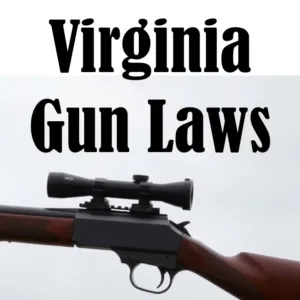Virginia’s gun laws offer a balance between gun rights and regulations. As a state that respects the Second Amendment, it allows both open carry and concealed carry, but it also enforces restrictions to ensure public safety. Understanding Virginia’s firearm laws is essential whether you’re a resident, planning to visit, or considering firearm ownership. This guide will cover the essential details on Virginia gun laws, including open carry, concealed carry, firearm purchases, restricted areas, and other vital regulations.
Virginia Gun Laws Overview

Open Carry in Virginia
Virginia is an open carry state, meaning anyone who is legally allowed to own a firearm can carry it openly without a permit. However, certain restrictions apply based on location and type of firearm. For example, open carry is not allowed in some public places or near schools. Additionally, individuals must be 18 years old or older to openly carry a firearm.
For those carrying in cities such as Alexandria, Richmond, or Newport News, local ordinances may impose restrictions on open carry, especially during events like protests or political rallies. It is important to check specific city regulations before carrying openly in urban areas.
Concealed Carry in Virginia
Virginia is a shall-issue state, which means that if you meet the eligibility criteria, the state must issue you a Concealed Handgun Permit (CHP). The CHP allows residents and non-residents to legally carry a concealed handgun.
How to Obtain a Virginia Concealed Handgun Permit (CHP):
- Be at least 21 years old.
- Complete a firearms training course approved by the state (available online or in person).
- Submit an application to your local circuit court or through Virginia State Police for non-residents.
- Pass a background check and meet all other eligibility requirements.
- Pay the required fee and wait for the permit to be processed.
The CHP is valid for five years and can be renewed by following a similar process. Virginia law requires permit holders to carry their permit whenever they are carrying a concealed weapon.
Who Can Legally Own a Firearm in Virginia?
To legally own a firearm in Virginia, you must:
- Be at least 18 years old to possess or purchase a long gun (rifle or shotgun).
- Be at least 21 years old to purchase a handgun.
- Not have a felony conviction or any misdemeanor domestic violence conviction.
- Not be subject to a protective order that prohibits firearm possession.
- Not have been involuntarily committed to a mental health facility or deemed mentally incompetent by a court.
- Not be an unlawful user of or addicted to controlled substances.
Purchasing a Firearm in Virginia
Virginia has no state permit requirement for purchasing firearms. However, all firearm purchases from licensed dealers are subject to federal background checks through the FBI’s National Instant Criminal Background Check System (NICS).
Firearm Purchases in Virginia:
- Licensed Dealer Sales: All firearms sold by federally licensed firearms dealers require a background check.
- Private Sales: Virginia requires background checks for private sales of firearms, with limited exceptions (such as transfers between immediate family members).
There is no mandatory waiting period to purchase a firearm in Virginia.
Handgun Purchase Limit
As of July 2020, Virginia reinstated the one-handgun-a-month law. This limits individuals to purchasing no more than one handgun per 30 days unless they have a valid CHP or meet certain exemptions (e.g., law enforcement officers, licensed firearms dealers).
Where Can You Carry a Gun in Virginia?
Virginia law outlines specific places where firearms are either restricted or prohibited altogether. Even individuals with a CHP must be mindful of these restricted areas.
- Schools: Firearms are prohibited on K-12 school property, including school buses and school-sponsored events, except for authorized personnel.
- Government Buildings: Firearms are banned in government buildings, courthouses, and certain other public facilities. Local governments also have the authority to restrict firearms in parks and community centers.
- Places of Worship: Firearms are generally prohibited in places of worship, except with permission from the religious institution.
- Bars and Restaurants: You may carry a concealed firearm in a restaurant that serves alcohol as long as you are not consuming alcohol. Open carry is also permitted, but you must abstain from drinking.
- Private Property: Private businesses have the right to prohibit firearms on their premises by posting signs that ban open or concealed carry. It’s important to respect these rules to avoid trespassing charges.
Stand Your Ground and Castle Doctrine in Virginia
Virginia does not have a specific Stand Your Ground law, but the state’s self-defense laws allow the use of deadly force if you are in imminent danger of death or serious injury and have no other reasonable way to escape or avoid the threat. This differs from Stand Your Ground laws in that you have a duty to retreat if safe retreat is possible, except in your own home.
Castle Doctrine
Virginia’s Castle Doctrine allows individuals to use deadly force against intruders in their home without the duty to retreat. If someone forcibly enters your home, the law assumes you have a reasonable fear of harm and are justified in defending yourself with deadly force.
Restrictions on Firearms in Virginia
Despite Virginia’s support of the Second Amendment, there are still important restrictions on certain individuals and types of firearms.
- Convicted Felons: Individuals convicted of a felony are prohibited from owning or possessing firearms unless their rights have been restored.
- Domestic Violence Offenders: Individuals convicted of misdemeanor domestic violence or subject to a domestic violence restraining order cannot possess firearms.
- Mentally Ill Individuals: Anyone who has been adjudicated as mentally incompetent or committed to a mental health institution is prohibited from owning firearms.
- Assault Weapons: Certain restrictions apply to the sale and possession of so-called “assault weapons” and high-capacity magazines. These laws primarily impact firearm modifications that make guns more lethal or suited for military use.
Reciprocity with Other States
Virginia has reciprocity agreements with many states, meaning that Virginia’s CHP is recognized in other states, and Virginia recognizes valid permits from those states. However, some states have different rules, and it’s important to research the specific laws of any state you plan to visit while carrying a concealed firearm.
The Virginia State Police maintain an updated list of states with which Virginia has reciprocity agreements.
Penalties for Violating Gun Laws in Virginia
Violating gun laws in Virginia can lead to criminal penalties, fines, and even imprisonment. Common violations include:
- Carrying Without a Permit: Carrying a concealed weapon without a CHP can lead to misdemeanor or felony charges.
- Possession by a Prohibited Person: Felons, domestic violence offenders, and those with mental health restrictions who are found in possession of firearms can face serious criminal charges.
- Carrying in Prohibited Areas: Carrying a firearm in restricted locations, such as schools or government buildings, can result in fines and jail time.
Conclusion: Understanding Virginia Gun Laws
Virginia offers significant freedoms for responsible gun owners, but it also has important regulations that must be followed to avoid penalties. With open carry laws and a shall-issue policy for concealed carry permits, Virginia allows individuals to exercise their Second Amendment rights while ensuring public safety.
Even though Virginia allows open carry, many individuals opt for a CHP to benefit from legal protections and carry in additional locations. Whether you’re purchasing a firearm, obtaining a concealed handgun permit, or simply carrying for self-defense, understanding the nuances of Virginia’s gun laws is crucial.
FAQs About Gun Laws in Virginia
1. Is open carry legal in Virginia?
Yes, open carry is legal in Virginia without a permit for individuals 18 years or older, except in certain restricted locations.
2. Do I need a permit to carry a concealed handgun in Virginia?
Yes, Virginia requires a Concealed Handgun Permit (CHP) to carry a concealed firearm.
3. Can I carry a firearm in my vehicle in Virginia?
Yes, you can carry a firearm in your vehicle as long as it is properly secured (e.g., in a closed compartment) or carried according to the state’s laws on open or concealed carry.
4. Are background checks required for private firearm sales in Virginia?
Yes, Virginia requires background checks for all private firearm sales, with certain exceptions for transfers between family members.
5. What are the penalties for carrying a firearm in a prohibited area?
Carrying a firearm in a prohibited area, such as a school or government building, can result in criminal charges, fines, and imprisonment.
